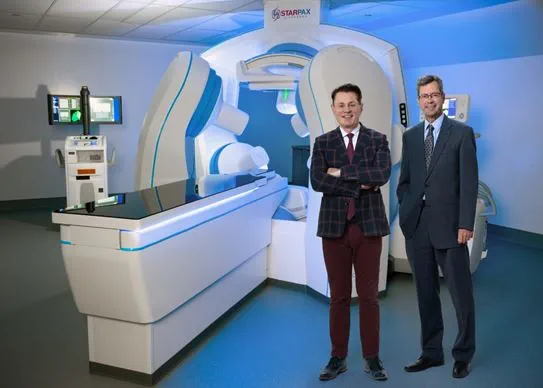Although chemotherapy drugs are successful in treating certain cancers, they can cause uncomfortable side effects and are not very efficient at reaching all cancer cells in a tumour. But a new scientific breakthrough that uses a specialized treatment platform that distributes anti-cancer drugs throughout the inside of tumours, is hoping to change that. This innovative concept was first devised by Dr Sylvain Martel at Polytechnique Montréal and the technology is now being developed into a new method for cancer therapy by Starpax Biopharma.
The new concept uses specialized bacteria, called Magnetodrones, whose trajectory is controlled via unique magnetic fields that contain the Magnetodrones inside the tumour and force them to distribute medication throughout, reaching areas that traditional treatments like chemotherapy cannot.
Dr Martel first developed the idea of using magnetically guided bacteria to target solid tumours such as prostate cancer. Over the years, this research has been supported by a grant awarded by Prostate Cancer Canada (now CCS) and funded by Movember. And in 2018, a Montreal-based company called Starpax Biopharma acquired the patents to develop a technology applicable to most types of solid tumours. The first clinical trials are set to begin in 2025.
“These new bacteria that we have developed to form the Magnetodrones generate magnetic iron crystals inside of them, similar to the approach birds use to guide their migration,” says Micheal Gareau, Founding President at Starpax Biopharma. “Just like birds use these magnetic properties to find North, we create a focal magnetic “north pole” that can move into the tumours, to force the Magnetodrones to distribute throughout its volume and reach cancer cells.”

Funding and partnerships to bring a new treatment to people with cancer
Dr Martel worked for more than 15 years to develop computer-controlled magnetic fields capable of pointing special bacteria in the right direction.
“This enables the distribution of therapeutic payloads where it would be the most effective while avoiding systemic toxicity for the patients as is the case for chemotherapy,” Dr Martel says.
For him, this couldn’t have happened without funding from Prostate Cancer Canada. In 2017, his team had just completed a solid proof of concept, but available funding sources were almost nonexistent, and he was about to lose key research staff with critical expertise.
“Approximately one week before letting staff go, we suddenly received PCC support,” Dr Martel says. “Without it, we would not be able to continue important work that opened the door to partner with Starpax BioPharma leading to this unprecedented cancer treatment for patients.”
Starpax BioPharma has already secured a partnership with the Jewish General Hospital in Montreal, where they have completed the construction of a new room equipped with the PolarTrak™, a medical device developed by Starpax to generate special magnetic fields to control the Magnetodrones within tumours. Clinical trials that could lead to life-changing treatment will start with six cancers: pancreatic, prostate, head and neck, rectal, vulval and breast cancers.
“This represents a big step in responding to a challenge that has been there and persists: resistance to treatment," says Dr Gerald Batist, director of Segal Cancer Centre at Jewish General Hospital. "We are committed to bringing this innovation to our patients here, but also eventually to patients everywhere in the world."
The Ministry of Economy and Innovation of Québec has granted $7 million to construct and implement the intervention room at the Hospital, dedicated to this innovative treatment. The Jewish General Hospital will be the first in the world to use these technologies in a clinical setting.
The potential benefits of this project show how cancer research needs the work of many people and organizations coming together to make change happen.
“This project was a complex multidisciplinary effort that required research funding over a long period,” Dr Martel says. “Now Starpax has the opportunity to make this unprecedented cancer treatment available to patients.”
To learn more about how CCS is investing in cutting-edge research, check out our research strategy.
